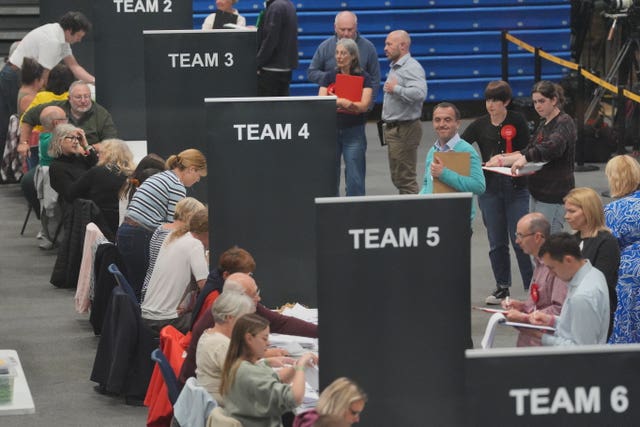UK chooses ‘brighter future’ as exit poll suggests landslide for Labour
Labour is on course for a resounding victory, ending 14 years of Conservative rule, an exit poll has indicated.

Sir Keir Starmer is set to become the UK’s next prime minister as voters chose a “brighter future” with Labour.
The party is forecast to win a landslide 170-seat majority, with the Tories reduced to their lowest number of MPs on record.
It means Rishi Sunak’s term as Prime Minister looks set to end in electoral disaster, with Nigel Farage’s Reform UK establishing a foothold in Parliament and the Liberal Democrats forecast to make gains.
In the first result of the night, shadow education secretary Bridget Phillipson held Houghton and Sunderland South, but Reform pushed the Conservatives into third place.
Ms Phillipson, who will now expect to be in Sir Keir’s first Cabinet, said: “Tonight the British people have spoken and if the exit poll this evening is again a guide to results across our country – as it so often is – then after 14 years the British people have chosen change.

“They have chosen Labour and they have chosen the leadership of Keir Starmer. Today our country with its proud history has chosen a brighter future.”
Reform also outperformed the Conservatives in Blyth and Ashington, which was also held by Labour.
The exit poll suggests Labour is on course for 410 seats, with the Tories reduced to 131.
The Liberal Democrats are forecast to win 61 seats, Reform UK on 13 and the Green Party two.
In Scotland, the SNP are expected to secure 10 seats with Plaid Cymru in Wales on four.
The poll for broadcasters involved more than 20,000 voters at 133 polling stations.
If the results follow the forecast it will mean a Labour prime minister in No 10 for the first time in 2010 and the Conservatives facing a possible civil war as the fight for the future direction of the party and the battle to potentially replace Mr Sunak gets under way.

After 14 years in power it was always going to be a difficult election for the Conservatives, but the sometimes shambolic campaign – triggered at a time of Mr Sunak’s choosing – has contributed to their party’s likely defeat.
From the rain-drenched speech announcing the surprise July 4 poll, through the D-Day debacle as he left Normandy early to record a TV interview to confused campaign messaging about a Labour “supermajority”, Mr Sunak struggled to convince the electorate he was the right man to lead the country.
Going for a summer election rather than waiting until the autumn was always a gamble, and the Prime Minister was not helped by the scandal of Tory candidates and officials allegedly heading to the bookies armed with inside knowledge of the date.
Mr Sunak is expected to resign after leading his party to defeat, but many of the contenders jostling to replace him are nervously awaiting their own constituency results to see if their leadership dreams survive the night.
The likes of Penny Mordaunt, Grant Shapps, Steve Baker and Robert Jenrick all face battles to return to Parliament, while Chancellor Jeremy Hunt is predicted to lose.
A Liberal Democrat source said they were “confident” of defeating the Chancellor in the Godalming and Ash seat in Surrey.
Former home secretaries Suella Braverman and Dame Priti Patel, security minister Tom Tugendhat and Health Secretary Victoria Atkins could survive to fight for the leadership.
A Tory source said: “It’s clear based on these results we will have lost some very good and hard-working candidates.”
Former justice secretary Sir Robert Buckland was the first high-profile casualty as he lost to Labour in Swindon South.
He said politics was now at a crossroads: “Do we value those who work to bring people together and who come into politics to do something rather than be someone, or do we shrug our shoulders and accept that politics is a mere circus, where people compete for attention by saying things that they either know to be untrue or which raise hopes and expectations in a way that further erodes trust?

“I know what side I’m on, I know what choice I would make. I believe with sincere and fierce conviction that my party has to make the right choice too if we are to inspire a new generation with a real promise of a better future.”
A lurch to the right after the election would be “disastrous” for the Conservatives, Sir Robert said.
Sir Robert told the BBC it “would be a disastrous mistake and it would send us into the abyss, and gift Labour government for many years”.
Northern Ireland minister Mr Baker, who had indicated he would run for the leadership if he survived but is forecast to lose his seat, said it was a “pretty devastating night for the Conservative Party”.
He told the BBC he expected Mr Sunak will now “do what he believes is in the national interest”.
Former Cabinet minister Sir Jacob Rees-Mogg said it is “clearly a terrible night”, suggesting voters had been put off by the revolving door in No 10 which saw Boris Johnson replaced first by Liz Truss and then by Mr Sunak.
Sir Jacob told the BBC “there were “issues with changing the leader”, adding: “Voters expect the prime minister they have chosen to remain the prime minister and for it to be the voters who decide when that person is changed.”





